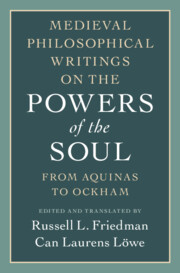Book contents
- Frontmatter
- Contents
- Acknowledgments
- Sources of the Translated Texts
- Notes on the Translations
- List of Abbreviations, Symbols, and Conventions
- Introduction:
- 1. Bonaventure (d. 1274), Commentary on the Sentences, book II, d. 24, a. 2, q. 1:
- 2. Albert the Great (d. 1280), Summa theologiae, book I, treatise 3, q. 15, chap. 2, a. 2, c. 1:
- 3. Thomas Aquinas (d. 1274), Commentary on the Sentences, book I, d. 3, q. 4, a. 2:
- 4. Henry of Ghent (d. 1293), Quodlibet III, q. 14 (excerpts):
- 5. Godfrey of Fontaines (d. ca. 1306), Quodlibet II, q. 4:
- 6. Thomas of Sutton (d. ca. 1315), Ordinary Question 4 (excerpts):
- 7. Peter of John Olivi (d. 1298), Questions on the Sentences, book II, q. 54 (excerpts):
- 8. John Duns Scotus (d. 1308), Commentary on the Sentences (Reportatio A), book II, d. 16:
- 9. James of Viterbo (d. 1308), Quodlibet I, q. 7, doubt 1:
- 10. Durand of St.-Pourçain (d. 1334), Commentary on the Sentences (Third Version), book I, d. 3, part 2, q. 2:
- 11. William Ockham (d. 1347), Commentary on the Sentences (Reportatio), book II, q. 20
- Glossary of Terms
- Glossary of Arguments
- Bibliography
- Index
7. - Peter of John Olivi (d. 1298), Questions on the Sentences, book II, q. 54 (excerpts):
Are the Soul’s Powers Totally the Same as Their Substance and as Each Other, Totally Diverse, or Partially the Same and Partially Diverse?
Published online by Cambridge University Press: 10 April 2025
- Frontmatter
- Contents
- Acknowledgments
- Sources of the Translated Texts
- Notes on the Translations
- List of Abbreviations, Symbols, and Conventions
- Introduction:
- 1. Bonaventure (d. 1274), Commentary on the Sentences, book II, d. 24, a. 2, q. 1:
- 2. Albert the Great (d. 1280), Summa theologiae, book I, treatise 3, q. 15, chap. 2, a. 2, c. 1:
- 3. Thomas Aquinas (d. 1274), Commentary on the Sentences, book I, d. 3, q. 4, a. 2:
- 4. Henry of Ghent (d. 1293), Quodlibet III, q. 14 (excerpts):
- 5. Godfrey of Fontaines (d. ca. 1306), Quodlibet II, q. 4:
- 6. Thomas of Sutton (d. ca. 1315), Ordinary Question 4 (excerpts):
- 7. Peter of John Olivi (d. 1298), Questions on the Sentences, book II, q. 54 (excerpts):
- 8. John Duns Scotus (d. 1308), Commentary on the Sentences (Reportatio A), book II, d. 16:
- 9. James of Viterbo (d. 1308), Quodlibet I, q. 7, doubt 1:
- 10. Durand of St.-Pourçain (d. 1334), Commentary on the Sentences (Third Version), book I, d. 3, part 2, q. 2:
- 11. William Ockham (d. 1347), Commentary on the Sentences (Reportatio), book II, q. 20
- Glossary of Terms
- Glossary of Arguments
- Bibliography
- Index
Summary
In this text, of which we have translated a large excerpt, Olivi defends his own version of the identity theory of the soul and its powers. On this version, the soul is a bundle of powers (plus spiritual matter), and so is identical to the entire collection of its powers (plus spiritual matter). To defend this view, Olivi first considers and rejects another version of the identity theory, on which the soul is a single power capable of eliciting all of the different vital acts associated with a living being. His main argument against this position is that diverse forms of production or of activity require powers that are themselves diverse by nature or essence. Olivi then attacks the distinction theory developed, for instance, by Aquinas, arguing that, among other things, this theory conflicts with our conception of ourselves as essentially free and rational agents. Next, Olivi criticizes Bonaventure’s distinction theory, arguing that it is impossible for the soul’s powers to be substances and yet dependent on the soul itself. Finally, Olivi puts forward his own preferred bundle theory of the soul and its powers.
Keywords
- Type
- Chapter
- Information
- Medieval Philosophical Writings on the Powers of the SoulFrom Aquinas to Ockham, pp. 122 - 144Publisher: Cambridge University PressPrint publication year: 2025

